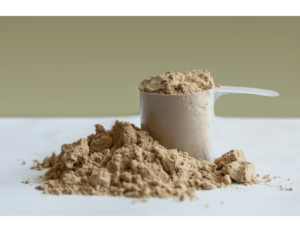In fitness and nutrition, protein powders have emerged as a quintessential supplement, lionized for their muscle-building and recovery-enhancing capabilities. Yet, amidst their burgeoning popularity lurks a less-discussed query: Does protein powder make you constipated?
This article ventures into the nitty-gritty of protein supplements and their impact on digestive health, armed with science-backed insights and expert opinions.
1. Understanding Protein Powder and Its Health Promises
Protein powders derived from sources like whey, casein, or plant-based alternatives such as peas and hemp promise an efficient, concentrated dose of high-quality protein. They’re a boon for athletes, bodybuilders giving health benefits to individuals aiming to meet their daily protein requirements, enhance muscle mass, and improve overall recovery. Yet, everything has a downside.

Read More: Is it Possible to Build Muscle in a Calorie Deficit?
2. The Digestive Dilemma: Protein Powder and Constipation
The conversation about protein powders often glosses over their digestive implications. A closer inspection reveals a nuanced picture. “While protein powders support muscle repair and growth, they can also impact gut health, potentially leading to constipation in some individuals,” notes renowned nutritionist Dr. Emily Stone. But what lies behind this digestive distress?
a. Why Constipation Might Occur
Several factors contribute to the constipating reputation of protein powders:
- Lack of Fiber: Protein powders are notorious for their minimal fiber content. Fiber is crucial for bowel health, stimulating regular bowel movements. High protein foods but low in fiber can disrupt this delicate balance, paving the way for constipation.
- Hydration Hurdles: Protein requires sufficient water for metabolism and digestion. High protein intake without adequate hydration can result in more complex, drier stools that are difficult to pass.
- Gut Microbiota Shifts: The “Journal of Clinical Nutrition” highlights that high-protein diets can alter gut microbiota composition, affecting digestion and exacerbating constipation symptoms.
According to gastroenterologist Dr. Laura Higgins, “Up to 15% of individuals adopting high-protein diets report experiencing constipation, underscoring the need for dietary balance and attention to digestive health.”
Read More: How Many Calories Does Weight Lifting Burn? Debunking the Myths
3. Side Effects of Overeating Protein
While constipation is a commonly flagged issue, excessive protein consumption can usher in a broader spectrum of side effects, affecting overall health beyond the digestive system. Consuming protein in amounts significantly above recommended levels can potentially lead to:
- Kidney Stress: High dietary protein levels can strain the kidneys, causing issues for individuals with pre-existing kidney conditions. The kidneys play a crucial role in metabolizing and excreting the byproducts of protein digestion, and an overabundance can exacerbate their workload.
- Bone Health Concerns: There’s an ongoing debate about high protein intake and its correlation with calcium excretion in scientific circles. Some theories suggest elevated protein levels may prompt the body to leach calcium from bones, potentially weakening them over time.
- Altered Blood Lipid Profiles: Certain protein sources, particularly those high in saturated fats like red meat, can influence cholesterol levels, raising the risk of heart disease. It’s essential to select lean protein sources and maintain a balanced intake of fats within your diet.
- Nutritional Deficiencies: Focusing intently on protein consumption can sometimes lead to the neglect of other vital nutrients. Varied diets ensure a harmonious supply of vitamins, minerals, and other nutrients essential for optimal body function.
A holistic approach to nutrition, emphasizing variety and balance, can mitigate these risks. The goal should always be to attain nutrition primarily from whole foods, with supplements as an adjunct, mainly when specific dietary goals or needs are in play.
Read More: What is an Active Calorie: Your Guide to Enhanced Fitness and Weight Management
4. How Do I Know if I’m Overeating Protein?
Identifying the signs of excessive protein consumption is crucial for maintaining an optimal nutrition balance. While individual protein needs vary based on factors like age, sex, activity level, and overall health, exceeding these needs consistently can present several noticeable symptoms, signaling it’s time to reassess your diet. Some critical indicators of excess protein intake include:
- Digestive discomfort, such as constipation, gas, and bloating, often results from inadequate fiber alongside high protein levels.
- Dehydration is evidenced by dark-colored urine, thirst, and reduced urination frequency since metabolizing protein requires more water than fats or carbohydrates.
- Unexplained fatigue or irritability, possibly due to the body’s increased effort to eliminate nitrogen in dietary protein through urine.
- Weight gain, as excess protein can be stored as fat, leading to unwanted weight accumulation if caloric intake surpasses caloric expenditure.
- Bad breath, caused by the body entering a state of ketosis when relying heavily on protein for fuel, can lead to a distinct breath odor.
Monitoring these symptoms and consulting a healthcare professional for personalized dietary advice can help prevent the negative impacts of consuming too much protein. It’s essential to strive for a balanced diet that provides the benefits of protein and incorporates a healthy mix of carbohydrates, fats, vitamins, and minerals to support overall health and well-being.
5. How much Protein Do You Need Each Day?
Determining the optimal daily protein intake is a multifaceted process that hinges on various personal factors, including an individual’s age, gender, weight, activity level, and overall health. According to the Dietary Reference Intake (DRI), the average sedentary adult requires about 0.8 grams of protein per kilogram of body weight daily. For example, a person weighing 68 kilograms (150 pounds) would need approximately 54 grams of protein daily to meet their basic nutritional requirements.
However, for those who lead more active lifestyles or engage in regular strength training, protein needs increase to support muscle repair, growth, and overall recovery. Athletes or active individuals might require between 1.2 to 2.0 grams of protein per kilogram of body weight.
Animal proteins, such as meat, dairy, and eggs, are considered “complete” because they contain all nine essential amino acids the body requires. In contrast, most plant-based proteins are “incomplete,” lacking one or more essential amino acids. However, eating a varied plant-based diet can ensure one consumes all necessary amino acids daily.
Read More: What is a Calorie in Chemistry?
6. Combating Constipation: Practical Tips
Worry not; constipation from protein powders isn’t inevitable. Here are actionable steps to maintain digestive harmony:
- Increase Fiber Intake: Incorporate fiber-rich foods like fruits, vegetables, and whole grains into your diet. Consider a protein powder that includes fiber, or blend your shakes with fibrous ingredients.
- Stay Hydrated: Amplify your water intake. Hydration is crucial in preventing the hardening of stools associated with high protein consumption.
- Mind Your Protein: Gauge your protein intake relative to your body weight and activity level. “Exceeding protein needs doesn’t equate to better results and can tax the digestive system,” advises fitness trainer Jordan Moss.
- Probiotics for the Win: Supplementing with probiotics can support a healthy gut microbiome, potentially mitigating constipation concerns.
7. Concluding Thoughts
In wrapping up our exploration of the question, “Does protein powder make you constipated?” it’s evident that the relationship between protein supplementation and digestive health is multifaceted. The bond between protein powder and constipation is complex, grounded in factors like fiber deficiency, inadequate hydration, and dietary imbalance.
By adopting a mindful approach to protein consumption—prioritizing fiber, hydration, and dietary diversity—you can enjoy protein supplements’ muscle-building benefits without compromising digestive wellness.
